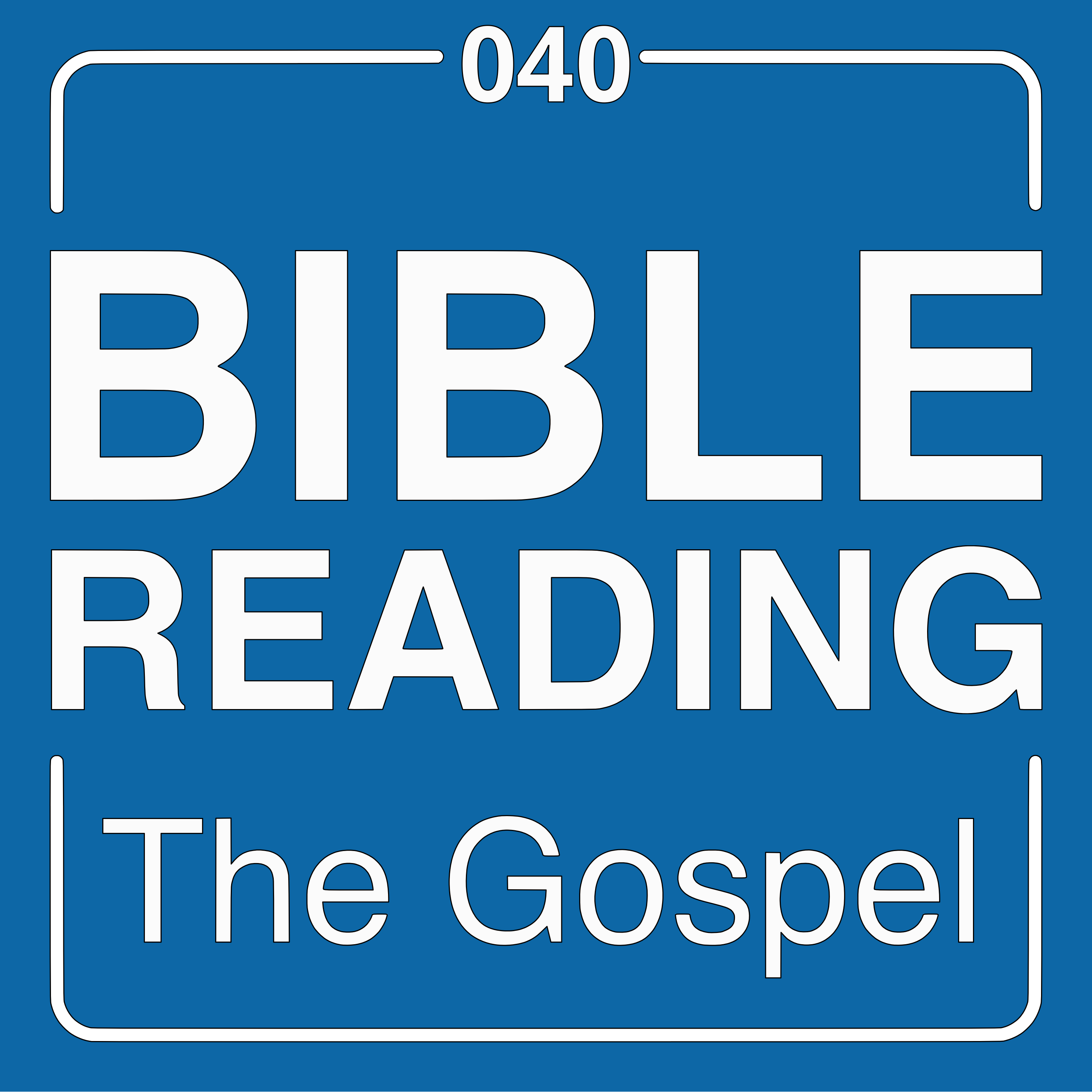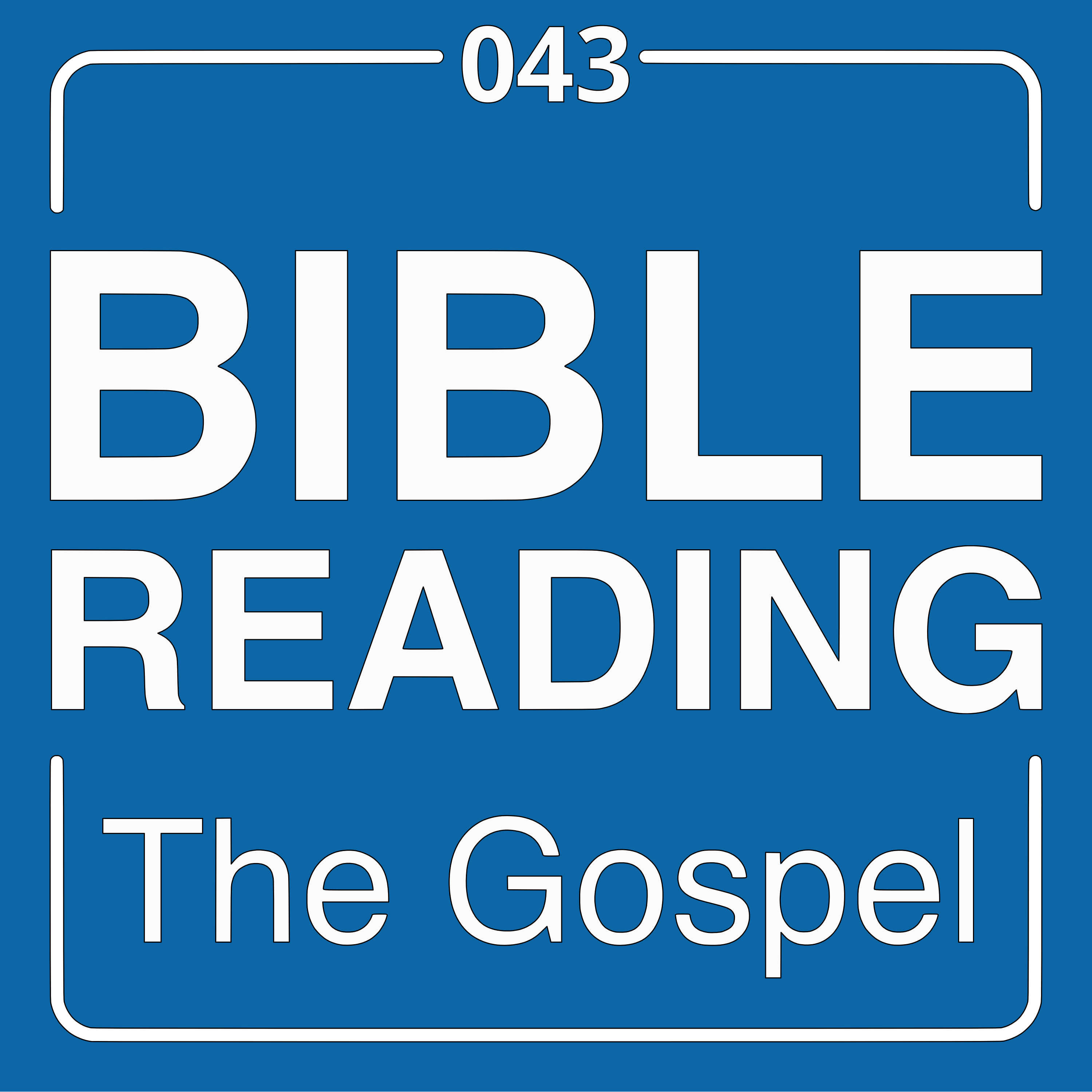Episode Transcript
[00:00:24] Speaker A: Hello, I'm Josh.
[00:00:25] Speaker B: And I'm Gabriel.
[00:00:26] Speaker A: And today on reading the gospel, we are studying the event the Jesus cleanses the ten leopards.
This is found in Luke, chapter eleven. And we're going to read all the way down to verse 19.
Hopefully you have your bibles with you and we invite you to follow along and read with us.
[00:00:45] Speaker B: On the way to Jerusalem, Jesus was passing along between Samaria and Galilee.
As he entered a village, he was met by ten lepers who stood at a distance and lifted up their voices, saying, Jesus, master, have mercy on us.
When he saw them, he said to them, go and show yourselves to the priest.
And as they went, they were cleansed.
[00:01:20] Speaker A: Then one of them, when he saw that he was healed, turned back, praising God with a loud voice, and he fell on his face at Jesus feet, giving him thanks. Now he was a samaritan. Then Jesus answered, were not ten cleansed? Where are the nine?
Was no one found to return and give praise to God except this foreigner? And Jesus said to him, rise and go your way. Your faith has made you well.
I don't know if you have any ailments that you would love for Jesus to cleanse, you'd love to not have. Paul had a thorn in his flesh that he struggled his whole life. You know, I have uticaria which makes my skin really itchy right now. I've got tennis elbow which makes my elbow really sore. And I would love to have those things healed.
If Jesus was walking by, do you think there's something in your life? You'd ask him, hey, can you take care of this for me?
[00:02:27] Speaker B: Absolutely. And we always have something that needs divine intervention.
[00:02:33] Speaker A: Yeah. And I think if you're a human being, you have something. There's something that you would like cleansed. And this group of lepers, they had to live outside. There was a leper colony. They could live together, but they had to stay away from other people. If people came around, they'd have to shout out, unclean, unclean, and let people know these were the rules. And so for them, their biggest desire would be to go back to normal society, civilized society. Go, leave the leper colony. Because not only did leprosy separate you from the group, leprosy was not fun. It was a painful disease as well.
[00:03:19] Speaker B: I just want to focus a minute on their request.
So when they saw Jesus, they said, jesus, master, have mercy on us.
I like this plural. It is not an individual request.
They were together into this. Between the introduction and the conclusion of this story, there is a line of separation between Samaria and Galilee. That is verse eleven.
And also at the end, this Samaritan is called a foreigner.
The fact that suffering and pain in life brings us closer to each other. So it was not that they were just pushed right into being away from the society, but they speak with one voice in time of peace. In our good days, it's very difficult to get united, to speak with one voice.
And we see nations or cities or families who are united. We appreciate them very much.
United we stand, divided with fall. And here we see how pain and suffering in life is bringing people together.
They are united into one group, they speak with one voice.
And I'm wondering, is this one of the purposes God allows pain and suffering in this world, to bring us closer together, to help us unite against our common enemy, to be able to speak with one voice that we always wanted deep in our hearts, when we feel.
[00:05:09] Speaker A: The results of sin, the consequences of sin, we as a human race come together and seek relief from the suffering.
That's awesome. And so Jesus tells them to go and show yourselves to the priests. He doesn't say, you're healed.
So for them to go and show themselves to the priests as they're walking away, they would obviously have leprosy still visibly, but they do it.
[00:05:45] Speaker B: Yeah. It was an act of faith.
[00:05:47] Speaker A: Yeah.
[00:05:48] Speaker B: Faith is not just a mental acceptance of a new reality. It is action.
Faith, it is trust. And trust is action in the same way as the people of Israel in the Old Testament were asked to cross the river Jordan and they touched it with the finger, it was water.
They touched the river with their feet, it was water. Right. And when the water went up against the ankle, that is when the river has parted, has divided into two.
God wants us to make steps by faith, and while going, our faith will have a response.
[00:06:40] Speaker A: Yeah. I think of Naaman washing in the the Jordan river, going under. He had to go under seven times. And it's not like the leprosy spots faded slowly. And he's like, oh, each time it's getting better and better.
It took that faith to go under seven times.
[00:06:58] Speaker B: And the same faith is necessary for another commandment to go. That is Matthew 28. Go and preach the gospel and make disciples. And sometimes we just sit down, we look through the window and say, those people, my neighbors, they will never ever be interested in the gospel. And we then go, and if we don't go, we do not exercise faith. And if we do not exercise our faith, atrophy will become weaker and weaker like muscles. We have to exercise our faith. The way we exercise our muscle.
[00:07:34] Speaker A: Yeah. And so these ten lepers, nine of them would be assumed to be jews.
They have faith, they believe in Jesus, they're coming to him, they act in faith. They go to the priest while still having leprosy, and they're cleansed on the way. So there's faith in this story.
The difference is only one came back.
One came back praising God with a loud voice. Now, we're not told what happens to the other nine. It says, no, none of them came except this foreigner. They were cleansed, they were healed from leprosy.
But this foreigner comes back and Jesus responses rise up, go your way, your faith has made you well. Is there a difference between this foreigner and the nine other lepers?
[00:08:41] Speaker B: According to Jesus words? Yes, it is. All ten of them were cleansed. That is in verse 14, the end of the verse. And this idea is being repeated in verse 17, but only this one was made well.
So it seems that there is a slight difference between being cleansed. That is, you don't have the symptoms of a disease, or by extension, in our spiritual application, you don't have the symptoms of sin.
But that is not enough to be made well.
World Health Organization when they define health, they say health is not just the absence of disease in our situation, being cleansed, it is that total well being of every dimension of the human being that is very important. We have to function well, to fulfill the purpose of life, and so on. So it seems that all ten of them had that level of faith, to be cleansed of leprosy. But only one took that face to the next level, to go back to Jesus Christ. And practically going back means moving forward in your spiritual journey. And Jesus told him your faith. The second stage of faith, has made you well, complete. We don't know the rest of the story, but I like to, in my mind, to make a parallel with the story of the demoniac healed in Gadara. When being made well means to get dressed, to be there with all your mind, to connect to Jesus Christ, to sit at his feet, to learn his teachings for an hour or so, and at the end, to be sent back to your people, to your village with a mission, go there and tell them what I've done for you and how I had mercy on you, said Jesus Christ. So being made well means to be restored to the purpose of life that God had for you. It is something positive. Cleansing is just the absence of the problem, but the solution and the purpose is not there yet. You need a second stage for that.
[00:11:07] Speaker A: And I know, I see this in my life at the end of the day, when I go through my day, you know, our family worship. We sit around the living room and we ask, how did God bless you today? And we praise God for those blessings.
And as we do those, as we come and worship God, he does work on our well being. You know, everything. Life is not perfect. There are issues that we deal with. But being connected to God, there's a well being in our character that is going to be okay, that as long as we stay connected to him, everything will work out. And so I think we can have this same well being when we come and give God praise, when we spend time with him, when we have thanksgiving, that we can find this peace that passes all understanding, that helps remove stress and anxiety from our lives, that draws us close to God and gives us a hope and a joy that we otherwise might not have. As we read this story, what does it tell us about God? How does it speak to us about God?
[00:12:28] Speaker B: What I took from this story is that God might work his will in my life in stages.
Sometimes I'm interested to find a solution just for this immediate problem. And this situation in this story is leprosy.
But God has always something better in mind for me, and God will take me to the next level. And after each experience, I have to have that landing moment, like the landing of stairs. When I pause, I look around, I just. One or two steps are horizontal. That is the moment when I look back to God, I talk to him, and I get resources to go up the next flight of stairs. Yes.
So this is how I see God, working in stages, starting with my limited understanding, moving towards his big picture and big purpose for my life.
[00:13:30] Speaker A: And how is this speaking to us today? This passage, what are we going to do about it again? For me, it comes back to just that reaffirmation of when we're blessed by God, come back to him and give him thanks, give him praise.
You know, I like to say worship is letting God know how much we love him, glorifying him and thanking him for what he's done in our lives. And as we go through that, life is put into a perspective that for me, it wouldn't otherwise have been. And the trials and problems and conflicts all seem to diminish.
When God is in control, it seems like I can handle them. I can make it through even if I'm not fully healed or fully cleansed. It will be okay as long as I'm connected with God. Let us pray. Father, we are so thankful for all the blessings you pour out on us. And. And we do pray before meals, and we pray when we need help. But do we come back and give thanks? I pray that we can look at this story and remember you when we receive good things, when we have answers and praise you and come and be in your presence.
And I pray, Father, that you will make us well. Not just cleanse us from sin, but make us well in our entire being. We ask these things in Jesus name. Amen. Amen.



